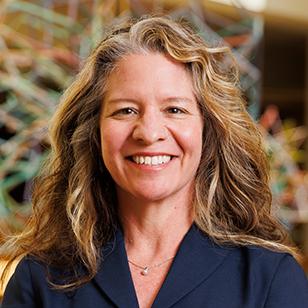The Indiana University Maurer School of Law is proud to welcome Andrew Hammond to the faculty beginning in January 2023.
Hammond is currently an associate professor of law at the University of Florida Levin College of Law, where he writes and teaches in the areas of administrative law, civil procedure, and poverty law.

“Andrew is an outstanding young scholar and teacher and we’re excited to welcome him for the spring semester,” said Indiana Law Dean Christiana Ochoa. “He’s doing important work in civil procedure and administrative law, and his focus on poverty aligns with many of our developing programs. We are excited to add Andrew and our other new and visiting faculty to our already outstanding group of scholars and teachers.”
It was the strong reputation of the faculty that attracted Hammond to Bloomington.
“I’ve long admired the scholarly culture at the Maurer School of Law,” he said. “The faculty is known nationwide as an intellectual and collegial group with a history of interdisciplinary work that extends beyond Indiana and the nation.”
Before joining the University of Florida, Hammond was a lecturer in the College and the Law School at the University of Chicago. Prior to entering academia, he clerked for then-Chief Judge Diane P. Wood of the U.S. Court of Appeals for the Seventh Circuit and Judge Robert M. Dow of the U.S. District Court for the Northern District of Illinois. He then went on to practice as a legal aid attorney at the Sargent Shriver National Center on Poverty Law in Chicago, first as a Skadden Fellow and later Of Counsel.
At Florida, Hammond has been a prolific scholar, with articles either published or forthcoming in the California Law Review, the Michigan Law Review, and the Northwestern University Law Review, among others. He said he’s eager to begin sharing his research with his new colleagues.

“The faculty at Maurer is so strong across the board,” Hammond said. “(They) have renowned scholars working in my chosen fields of civil procedure and public law and in several adjacent areas of interest. It’s incredibly appealing to have the opportunity to work with the Maurer faculty.”
Aneil Kovvali, a corporate law and governance professor, joined the Law School in fall 2022 from the University of Chicago School of Law.
In addition to Hammond and Kovvali, the Law School welcomed three highly regarded visiting professors this year: Kellye Testy, Cynthia Williams, and Zhuhao (Henry) Wang.

Testy, who was in residence for spring 2022, is the president and chief executive officer of the Law School Admissions Council. A 1991 graduate of the Maurer School of Law, Testy is a prolific scholar, outstanding teacher, and experienced administrator. She focuses her research and scholarship on contracts, corporate governance, business entities, leadership, and access to justice. She is known throughout academic and legal communities for her dedication to the rule of law and its commitment to justice and equality, and served as dean of the University of Washington School of Law from 2009-17.

Williams joined York University’s Osgoode Hall Law School (Toronto) in 2013 as the Osler Chair in Business Law, a position she also held from 2007 to 2009. Before moving to Osgoode, she was a member of the faculty at the University of Illinois College of Law and, prior to that practiced law at Cravath, Swaine & Moore in New York City. Her book, The Embedded Firm: Corporate Governance, Labor, And Finance Capitalism, co-edited with Osgoode Professor Peer Zumbansen, was published in 2011 by Cambridge University Press and was featured at the Society for Socio-Economics Annual Conference in 2012 at MIT. Her groundbreaking work explores how finance, securities, and corporate law are essential to addressing the most pressing social and environmental problems of our time. Her recent articles have appeared, for example, in the Texas Law Review, the Cornell International Law Journal, and the Journal of Corporate Law. Williams is visiting the Maurer School of Law through the end of the fall 2022 semester.

Wang is visiting from the China University of Political Science and Law, where he serves as an associate professor. A 2011 graduate of Indiana Law, Wang’s research focuses on evidence and proof, exploring evidence law outside the jury context and common law traditions, and rethinking evidentiary rules for important non-jury proceedings like bench trials, arbitration and administrative proceedings. His scholarship has been published with or is forthcoming in the Vanderbilt Law Review, UC Irvine Law Review, and International Journal of Evidence and Proof, among other journals. While teaching, Professor Wang serves as Councilor and Associate Executive Director of the International Association of Evidence Science.














